The Man Who Planted Trees 木を植えた男
今回ご紹介いたしますのは、
The Man Who Planted Trees (Jean Giono:ジャン・ジオノ)
木を植えた男
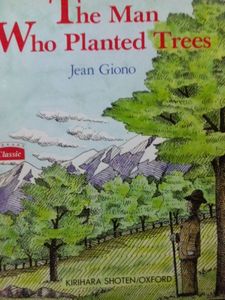
「木を植えた男」という、この本の題名は、かなり多くの方の記憶に残っておられると思いますし、実際に、子供の頃に翻訳の絵本で読まれ感動された方も、大勢おられると思います。
現在でも、かなり人気の高い本だと思います。
作者のJean Gingo (ジャン・ジオノ)は、フランスの作家(1895年~1970年)ですが、この本の主人公エルゼアール・ブフィエ(木を植えた男)の生き方にならい、この本に対する著作権を放棄していまして、世界数十カ国で翻訳出版されたこの本からは、一切利益を得ていません。
内容に比重が置かれてしまう本書なのですが、中学ないし高校の副教材として指定されている場合も多く、英文は比較的やさしめと思います。中学生だと、辞書を引く回数が少し多くなる、という感じかと思います。高校生ならば、ほとんど辞書ナシで読める人もいることでしょう。
それでは、さっそく、「木を植えた男」の物語をみてゆきたいと思います。
章立てで、第5章までありますので、少し長くなっていますが、心に伝わるお話でもありますので、特別に、全編を掲載させていただきました。
☆☆序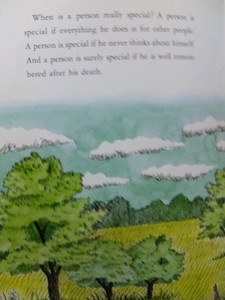
☆
When is a person realy special?
A person is special if everything he does is for other people.
A person is special if he never think about himself.
And a person is special if he is well remembered after his death.
☆☆第1章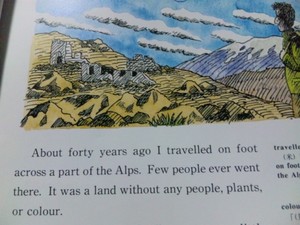
About forty years ago I travelled on foot across a part of Alps. Few people ever went there.
It was a land without any people , plants, or colour.
After three days I finally came to a little village. No one lived there any more. I needed water, and thought I maight find some there.
But the little river was dry. There were five or six houses ; however, they were almost completely destroyed by wind and rain. There was also a little church, but there was no life anywhere. The place was ghost town.
※
on foot:歩いて
Few people ever went there:ほとんどの人は、そこへ行ったことがない。
No one lived there any more:もはや、そこには誰も住んでいない。
find some=find some water
almost completely destroyed:ほとんど完全に破壊されていた
ghost town:ゴーストタウン・廃墟の町
☆
It was a fine, sunny day in June. Since there were no trees, the wind was strong and wild, like an angry lion. I had to move on. I could not stay there.
※
I had to move on:私は、移動し続け(歩き続け)なければならなかった。
☆
I walked on for five hours, and still could not find any water. I began to lose hope.
Everything around me was dry, very dry. Then, far away in the distance, I thought I saw smething small and dark. Was it a tree ?
I started walking towards it. It was a man , and he was with his sheep. There were about thirty of them.
※
I began to lose hope:望みを失いかけていた
Then, far away in the distance:そのとき、はるか遠く離れたところに、
☆
He gave me some of his water, and I felt much better. He then took me to his little house. The man did not say very much. people who live alone are often like that.
And he was not afraid at all. That was a little strange since there was no one else in this wild country.
※
He then took me to his little house:彼は、それから、私を、彼の小さな家へと連れて行った
people who live alone are often like that:(皆と離れて)一人で暮らしている人というのは、しばしば、そういうふうなのだ。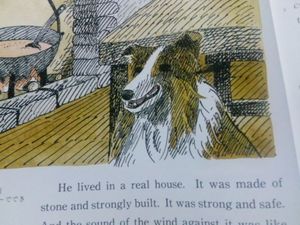
☆
He lived in a real house. it was made of stone and strongy built. It was strong and safe. And sound of the wind against it was like sound of the sea.
Inside, the house was well kept. Innoticed that dishes were washed and the floor was clean. His soup was cooking over the fire. He gave me a bowl of it. I looked at him again. His clothes were very neat. He did not smoke. He had a dog. It was quiet, too, friendly, and not afraid.
☆
We both understood that I would have to spend the night there. The nearest village was a day and a half away. I also knew that life was ard inthe few villages in that part of the country. There were four or five of them, but they were quite far apart. Families lived together in amall houses. Thier lives were empty,and nobody was happy.
Of course, it was not easy to live in such a place.
In addition, the weather was bad both in winter and summer.
And there was a very strong wind which never stopped. The people who lived there could only wait to die or go mad.
※
they were quite far apart:それらの村は、非常に離れて孤立していた。
In addition:加えて
☆☆
「私」がアルプスの荒野を歩いていて出会った「男」は、廃墟の町で羊を飼いながら一人で暮らしている(+犬一匹)人だったのですね。
さて、その男の日常はどのようなものだったのでしょうか?
「私」が、そこで、見た光景とは?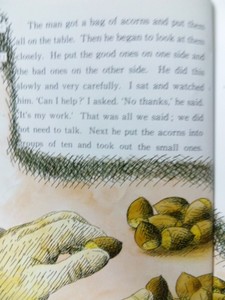
☆
The man got a bag of acorns and put them all on the table. Then he began to look at them closely. He put the good ones on one side and bad ones on the other side. he did this slowly and very carefully. I sat and watched him. "CanI help?" I asked. "No, thanks," he said. " It's my work." That was all we said; we did not need to talk. Next he put the acorns into groups of ten and took out the small ones.
After that he looked at the acorns more closely. He serected one haundred good ones, and then we went to bed.
It felt good to be wit this man, and I felt good to be wit this man, and I wanted to stay be with this man, and I wanted to stay another day with him. When I asked, he quickly agreed. Actually, there was no real reason to stay. I Just wanted to find out more about him.
※
acorn:どんぐり
☆☆第2章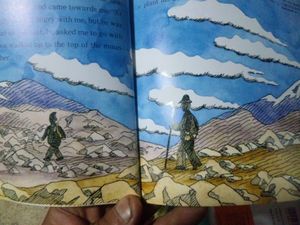
☆
The next morning he let out the sheep and headed for the mountains. Before he left, however, he put his acorns into some water. He also carried a long piece of iron with him.
I walked in the same direction, but took a different path up the same direction, but took a different path up the mountain. When he saw me, he left his sheep and came towaards me. At first I thought he was angry with me, but he was not angry at all. In fact, he asked me to go with him, and we walked up to the top with him, and we walked up to the top of the mountain together.
☆
With his piece of iron, he made a hole in the ground there, and in it he planted an acorn. I then understood him a little better. He just wanted to plant trees.
Was this his land ? When I asked him, he answered that it was not. "Do you know whose land it is ? " I said. He did not know. " The land is for everybody," he said. He did not even want to know whose land it was. With the greatest care, he continued to plant his acorns.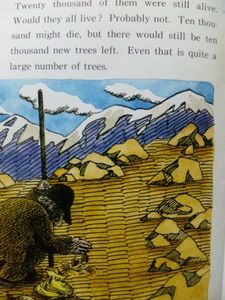
☆
At twelve noon we ate our lunch, and then he started to plant again. I asked him many questions and he answered them. him many questions and he answered them.
In three years this man planted one hundred thousand trees. Twenty thousand of them were still alive. Would they all alive ? Probably not. Ten thousand might die, but there would still be ten thousand new trees left. Even that is quite a large number of trees.
※
one hundred thousand trees:100×1000=十万本の木
☆
I began to wonder about the man's age. How old was he ? Looking at him, I knew he must be over fifty. He was fifty-five, he told me.
His name was Elzèard Bouffier(:エルゼアール・ブフィエ).
He once owned a farm in the lowland.
His life there was quite good. But his only son died, and then his wife. He came to this isolated place to live with his sheep and his dog. He believed that this land might soon die because there were no trees.
※
isolated place:孤立した場所
☆
In those day I was still young and lived alone, so I could understand him well. Perhaps because I was young, I looked to the future. I told him that in thirty years his ten thousand trees would surely be a wonderful sight.
He said that he wanted to plant many more and then ten thousand would seem very few.
He knew a lot about all kind of different trees. He had many baby trees near his house.
He kept his sheep away from the trees so that they would not eat them. His little trees were very beautiful, indeed.
The next day we said goodbye and I left.
☆☆
こうして、「私」は、彼と別れたのです。
はたして、その後彼は、彼の植えた木は、どうなったのでしょう?
☆☆第3章
☆
War broke out the following year in 1914, and I was in it for the next five years. I had no time to think about trees. To be onest, I did not remember much about him or the trees. I thought the trees were just a kind of hobby for him.
※
War broke out the following year in 1914:戦争が、その翌年の1914年に突然おこった
just a kind of hobby:ただ単に趣味・道楽のようなもの
☆
When the war was over, I need a rest. I had a little money, and wanted to spend some time in a place with fresh, clean air. So I returned to those mountains again.
The country there was the same as before. But far away, on the other side of village, I away, on the other side of village, I could see a kind of mist over the mountain tops.
I began to think again of the tree-planter. 'Ten thousand trees,' I thought, ' is realy a lot of trees.'
☆
During the five years of the war, I saw many men die. It was easy, therefore, to image that Elzèard Bouffier was also dead.
At twenty you think that men of fifty are old men and are just waiting to die.
But he was not dead; in fact, he was very well. He now had only four sheep but a great many bees. He no longer kept a large number of sheep because they were a danger to his trees.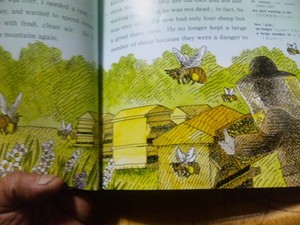
☆
When we talked, he said the war did not affect him at all. His life was the same, and he never stopped planting trees.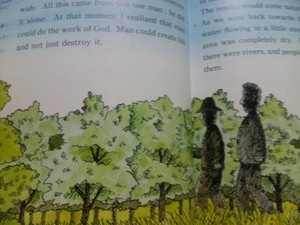
☆
The trees of 1910 were already ten years old and were taller than either of us. They were truly beautiful sight.
I could not find the right words, and as usual could not find the right words, and as usual he did not talk either.
We spent all day walking through his forest. It was eleven kilometres long and three kilometres wide. All this came from this one man; he did it alone. At the moment I realized that man could do the work of God. Man could create life and not just destroy it.
※
the work of God:神のなせる業
☆
Trees were everywhere. Some of them were as high as my everywhere. Some of them were as high as my shoulder, and there were smaller trees, too. He planted them five years before in 1915. Those trees were like young girls, but strong.
He did not stop to think about the meaning of his actions. He just continued to plant trees. The result would come naturally, he believed.
As we went back towards the village, I saw water flowing in a little stream. Recently the area was completely dry. But long,long ago, there were rivers, and people even caught fish in them.
※
He did not stop to think about the meaning of his action:
かれは、自分の行動の意味について考えることを止めなかった
He just continued to plant trees:かれは、ただ木を植え続けたのだ
☆
The wind carried the seeds of other plants there, too. When the water came back, these plants began to grow again. Flowers and grass appeared, and people had something to live for again.Everything happened little by little.
People saw the trees and plants, but did not stop to think about them. No one knew Elzèard Bouffier(:エルゼアール・ブフィエ) and his trees. No one would believe that a man could work so hard for other people.
※seed:種
☆
How can we understand this man ? We must not forget that he worked alone. That is the most important thing to remember. Towards the end of his life, he stopped speaking altogether.
Why ? Because he was alone so long ? Or because he did not think there was any need to speak ?
☆☆第4章
In 1933 a forest ranger came to see Bouffier. He told the old man not to start any fires. One fire, he said, could easily destroy this 'natural forest ' . The ranger also said that he never saw a forest like that before.
※
この森林保安員は、この「自然の森」(原始林)が、Bouffier が一本一本植えた木々の成長した姿だということに、気付かなかったのですね。
At that time Bouffier was about to plant trees twelve kilometres away from his house. He was seventy-five then and did not want to travel to and from his house all the time. He therefore decided to build a little stone house near his trees.
Several years later in 1935 some people of government came to look at the natural forest. They thought the young trees were very beautiful. they talked about the trees a long time, and then decided that the forest must be saved at all costs.
The government would stop people from doing anything dangerous to the forest.
※
must be saved at all costs:どんな犠牲を払ってでも、保護しなければならない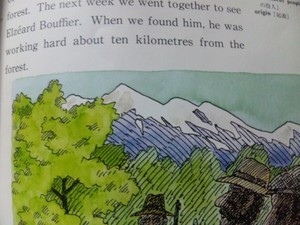
☆
One of the government people was a friend of mine, and I told him about the origin of the forest. The next week we went together to see Elzèard Bouffier(:エルゼアール・ブフィエ). When we found him, he was working hard about ten kilometres from the forest.
I gave Bouffier some eggs and we ate our lunch together. Then the three of us sat and looked at the forest around us. We said nothing. there were trees everywhere. Some of the trees were six to eight metres tall.
I remembered land in 1913. Nothing was growing there twety years earlier.
This old man still worked on quietly in the fresh mountain air. He was not affectedly by the world outside. He was still quite healthy and strong. How many more trees would he plant ?
Before we left, my friend gave Bouffier the names of several trees which might grow well there. Later he said, 'Bouffier probably knows more about these things than I do.'
We walked on for about an hour and he thought about it. Then he suddenly said,' He really does know a lot more about trees than anybody else. He has found a wonderful way to be happy.'
My friend sent three ranger to look after the forst. Thanks to my friend, the forest was left to grow. This, of course, made Bouffier even happier.
※
thanks to my friend, the forest was left to grow:友人のおかげで、「森」は何者にもジャマされずに育った
☆
The only true danger to the forest came during World War Ⅱ. Life became hard and people needed wood, so they started to cut down some of the trees of 1910.
But the forest was quite far from the nearest town, and those people soon stopped coming. Bouffier saw none of this. He was thirty kilometres away. He just went on with his work as usual. He was not part of war.
☆☆第5章
☆
I saw Elzèard Bouffier for the last time in June of 1945, right after the war. He was then eighty-seven years old. I took the same road as before, but now there was a bus between the valley and the mountain. Everything seemed different. This was probably because I was in a bus and not on foot. But when I saw the name of certain village, I knew I was on the name of certain village, I knew I was on the rigth road.
I got off the bus at Vergons. In 1913 there were eleven or twelve huse there, but only three people lived in them there, but only three people lived in them. Those people were tough and unfriendly. They lived by catching wild animals,and grass was growing all around the empty houses. Those people were clearly without hope. they were just waiting to die. And people like that are usually not kind to one another or strangers.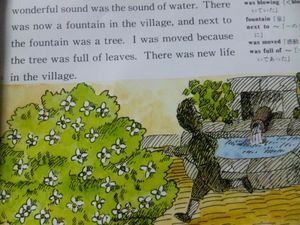
☆
Now everything was different especially the air. There were no dry, strong wind. The sweet-smelling air moved softly. A pleasant wind was blowing in the forest. The most wonderful sound was the sound of water. There was now a fountain in the village, and next to the fountain was a tree. I was moved because the tree was full of leaves. There was new life in the village.
※
I was moved:私は感動した(心を動かされた)
☆
The changes in Vorgons showed that the people were hopeful again. The old buildings were no longer there. Five houses were new. Twenty-eight people lived in the village, and four of them were young and ready to start families. The new houses had gardens with lots of flowers. It was now a happy village to live of flowers. It was now a happy village to live in.
From there I went on foot. Life was not the same as it was before the war. Not enough time had passed. But the grass was green again, and many plants could be seen everywhere. There was new life and hope there,too.
☆
And now the area is rich again. People live on nice, area is rich again. People live on nice, little farms, and lead happy lives. In 1913, there was nothing. The old river are running again,thanks to rain and snow from the forest.
※
lead happy lives:幸せに暮らす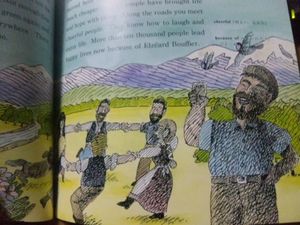
☆
These River now run down onto the fresh green farmland. Little by little the village have grown bigger. People have moved here from the towns, because land is much cheaper. These people have brught life and hope again.
Along the roads you meet cheerful people. They know haw to laugh and enjoy life. More than ten thousand people lead happy lives now because of Elzèard Bouffier.
☆
One man was able to create this rich land from nothing. He did it by himself; no one helped him. It was trury hard to believe. It was a kind of miracle.
At that point, I could see the greatness of Man, and I could especially see the greatness of Man, and I could especially see the greatness of that simple, old man. his work was the work of God.
Elzèard Bouffier died quitely in 1947 at the home for old people in Banon.
☆☆☆
少し長くなりました。
第1章から第5章まで、全編をみていただきましたが、いかがでしたでしょうか。
ジャン・ジオノが記した、ただひたすらに木を植え続け、荒れ果てた不毛の荒野を豊かな緑の森に変えた男の物語、
「The Man Who Planted trees」(木を植えた男)
英文は、あくまでやさしく、
静かに、読んで、心の糧としたい、そんな物語だと思います。




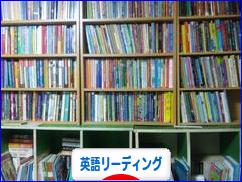




『木を植えた男』私はラダーシリーズで読みましたが、こっちの方がやさしくて読みやすいですね。とても参考になりました。ありがとうございます。♪
by 英語リーディングスクール (2011-12-10 02:53)
英語リーディングスクールアキヒロさま、どうもです。
翻訳をそのまま全部掲載というのは、どうもマズイ事態なのですが、自分で原典にあたれないので、今回は、ジオノさんの意思に免じてということで、そっくり写させていただきました。
いくつかあるなかでは、こちらの英文は、やさしく出来ていると思います。絵本で出しているというのが、その理由かと思います。
by 足立sunny (2011-12-10 14:36)
NO NAME さんへ。
楽しいお話を、ありがとうございます。
ビックリすると同時に、ブログとしては、滅多にないことですので、うれしく思います。
みなさんも、驚かれると思いますが、一度訪問させていただきたいと思います。
by 足立sunny (2012-01-12 02:09)